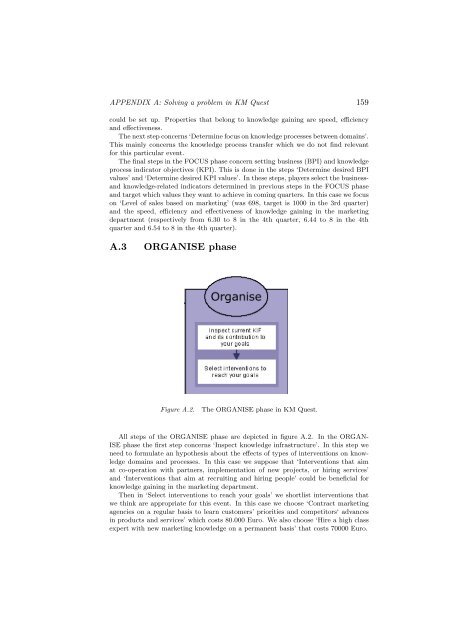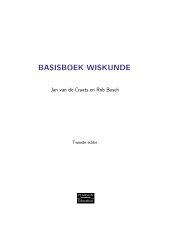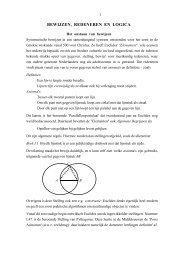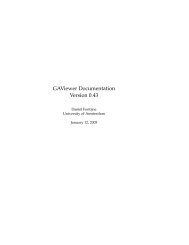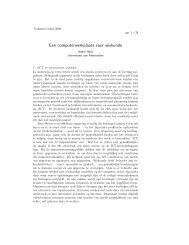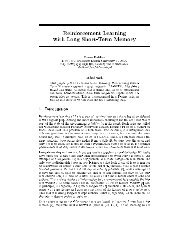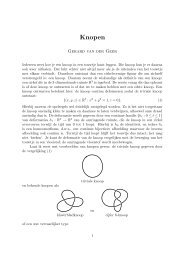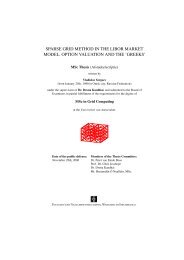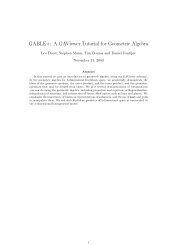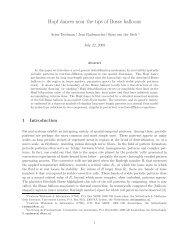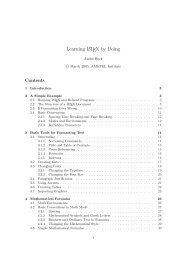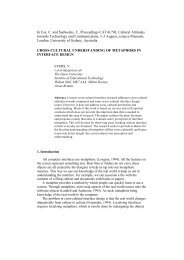The role of metacognitive skills in learning to solve problems
The role of metacognitive skills in learning to solve problems
The role of metacognitive skills in learning to solve problems
You also want an ePaper? Increase the reach of your titles
YUMPU automatically turns print PDFs into web optimized ePapers that Google loves.
APPENDIX A: Solv<strong>in</strong>g a problem <strong>in</strong> KM Quest 159<br />
could be set up. Properties that belong <strong>to</strong> knowledge ga<strong>in</strong><strong>in</strong>g are speed, efficiency<br />
and effectiveness.<br />
<strong>The</strong> next step concerns ‘Determ<strong>in</strong>e focus on knowledge processes between doma<strong>in</strong>s’.<br />
This ma<strong>in</strong>ly concerns the knowledge process transfer which we do not f<strong>in</strong>d relevant<br />
for this particular event.<br />
<strong>The</strong> f<strong>in</strong>al steps <strong>in</strong> the FOCUS phase concern sett<strong>in</strong>g bus<strong>in</strong>ess (BPI) and knowledge<br />
process <strong>in</strong>dica<strong>to</strong>r objectives (KPI). This is done <strong>in</strong> the steps ‘Determ<strong>in</strong>e desired BPI<br />
values’ and ‘Determ<strong>in</strong>e desired KPI values’. In these steps, players select the bus<strong>in</strong>essand<br />
knowledge-related <strong>in</strong>dica<strong>to</strong>rs determ<strong>in</strong>ed <strong>in</strong> previous steps <strong>in</strong> the FOCUS phase<br />
and target which values they want <strong>to</strong> achieve <strong>in</strong> com<strong>in</strong>g quarters. In this case we focus<br />
on ‘Level <strong>of</strong> sales based on market<strong>in</strong>g’ (was 698, target is 1000 <strong>in</strong> the 3rd quarter)<br />
and the speed, efficiency and effectiveness <strong>of</strong> knowledge ga<strong>in</strong><strong>in</strong>g <strong>in</strong> the market<strong>in</strong>g<br />
department (respectively from 6.30 <strong>to</strong> 8 <strong>in</strong> the 4th quarter, 6.44 <strong>to</strong> 8 <strong>in</strong> the 4th<br />
quarter and 6.54 <strong>to</strong> 8 <strong>in</strong> the 4th quarter).<br />
A.3 ORGANISE phase<br />
Figure A.2.<br />
<strong>The</strong> ORGANISE phase <strong>in</strong> KM Quest.<br />
All steps <strong>of</strong> the ORGANISE phase are depicted <strong>in</strong> figure A.2. In the ORGAN-<br />
ISE phase the first step concerns ‘Inspect knowledge <strong>in</strong>frastructure’. In this step we<br />
need <strong>to</strong> formulate an hypothesis about the effects <strong>of</strong> types <strong>of</strong> <strong>in</strong>terventions on knowledge<br />
doma<strong>in</strong>s and processes. In this case we suppose that ‘Interventions that aim<br />
at co-operation with partners, implementation <strong>of</strong> new projects, or hir<strong>in</strong>g services’<br />
and ‘Interventions that aim at recruit<strong>in</strong>g and hir<strong>in</strong>g people’ could be beneficial for<br />
knowledge ga<strong>in</strong><strong>in</strong>g <strong>in</strong> the market<strong>in</strong>g department.<br />
<strong>The</strong>n <strong>in</strong> ‘Select <strong>in</strong>terventions <strong>to</strong> reach your goals’ we shortlist <strong>in</strong>terventions that<br />
we th<strong>in</strong>k are appropriate for this event. In this case we choose ‘Contract market<strong>in</strong>g<br />
agencies on a regular basis <strong>to</strong> learn cus<strong>to</strong>mers’ priorities and competi<strong>to</strong>rs‘ advances<br />
<strong>in</strong> products and services’ which costs 80.000 Euro. We also choose ‘Hire a high class<br />
expert with new market<strong>in</strong>g knowledge on a permanent basis’ that costs 70000 Euro.


